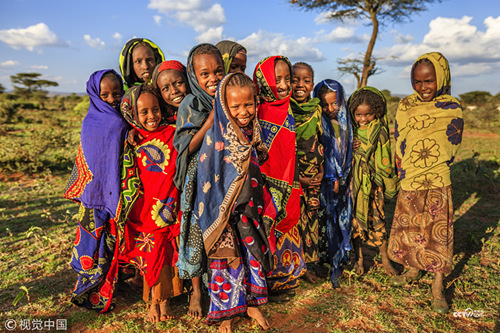By Tom McGregor, CCTV.com commentator and copy editor

The continent of Africa for much of its history had been viewed by outsiders in a negative tone. A number of Western governments had endorsed policies of colonialism and exploitation in Africa.
They felt justified pursuing such actions, under the assumption, they had considered the African people as second-class citizens and so they had to teach them how to adapt to civilization. Meanwhile other colonizers arrived in Africa to engage in a massive land grabs and to seize its rich yields of natural resources.
Nevertheless, a dramatic shift happened in Africa after World War II. when European governments, especially the United Kingdom, had divested itself of territorial rights over the continent, but then new challenges had ensued after African nations had captured their independence, since civil wars and corruption had become more widespread.
The next stage of Africa’s relations with the world can best be described as the ‘Nanny State’ Era, when Western governments to show remorse over past actions had offered huge sums of foreign aid to Africa.
Sounds wonderful, but the offering of huge aid packages had caused certain corrupt African governments to steal the funds and divert the money towards their own personal use. As a counter-strategy, Western government had imposed new restrictions on aid, requiring African governments to support Western governments in order to receive special treatment. Africa had to obey the West or lose out on generous aid packages.
Most of Africa did not benefit in the long-run when the West delivered so much humanitarian aid to them. That’s because Africans were not required to work in full-time employment or to build infrastructure or open new businesses in order to receive Western-based assistance. Hence, the over-generous aid packages had bred a culture of laziness and ingratitude, but that’s not the fault of Africans, since it’s human nature to behave this way under such circumstances.
Recognizing the deep societal problems in Africa, the Chinese government offered a new ray of hope for the continent by promoting industrialization, urbanization and modernization on the continent, but without enforcing hegemonic principles. That means Beijing would offer aid, but in return Africa would be expected to make efforts to ensure there would be some type of return on an investment.
The Chinese showed respect for Africans by treating them as business associates rather than charity cases. The concept would encourage more Africans to join the ranks of the international business community and they had to abide basic rules of economic cooperation.
For the measures to succeed, Beijing established the Forum on China-Africa Cooperation (FOCAC) in 2000 to strengthen diplomatic and economic ties between China and African nations, as government officials and business leaders would agree to meet face-to-face on frequent basis, while government leaders of participating member states would convene for a FOCAC Summit every three years.
The 2018 Beijing Summit of the FOCAC is held in China’s capital city on Sept. 3-4, 2018. The last forum was held in Johannesburg, South Africa in 2015 when Chinese President Xi Jinping pledged a US$60-bn. commitment from China to invest in joint projects in Africa, such as building new railroads networks, highways, airports, shipping ports, power plants, boost transmission grids and dig fiber optics lines to connect Africa with more extensive digital telecommunications.
During this year’s FOCAC Summit, President Xi delivered a keynote address and he highlighted China’s Belt and Road Initiative in partnership with African countries. The construction of massive infrastructure in Africa would require huge capital resources and Beijing, along with Chinese companies can play crucial roles to deliver financing, either as loans or direct investments.
Additionally, Xi had addresses key topics of concern in regards to the China-Africa friendship. He believes they can work in partnership to achieve mutual prosperity and welcomes “High Level Dialogue between Chinese and African leaders and business executives,” according to China.org.
Xi believes China and African countries can initiate a new era of international cooperation that will ensure improved diplomatic relations and economic cooperation on both sides.
Consequently what we are witnessing is Africa is a new and glorious era of modernization. Africans are treated with respect and as reliable business partners. They are no longer viewed as 2nd Class citizens. By building more infrastructure, Africa will transform into an economic powerhouse.
China has and will continue to pave the path for progress in the African continent, which will deliver win-win results for both China and Africa.
(The opinions expressed here do not necessarily reflect the opinions of Panview or CCTV.com. )

Panview offers a new window of understanding the world as well as China through the views, opinions, and analysis of experts. We also welcome outside submissions, so feel free to send in your own editorials to "globalopinion@vip.cntv.cn" for consideration.
















